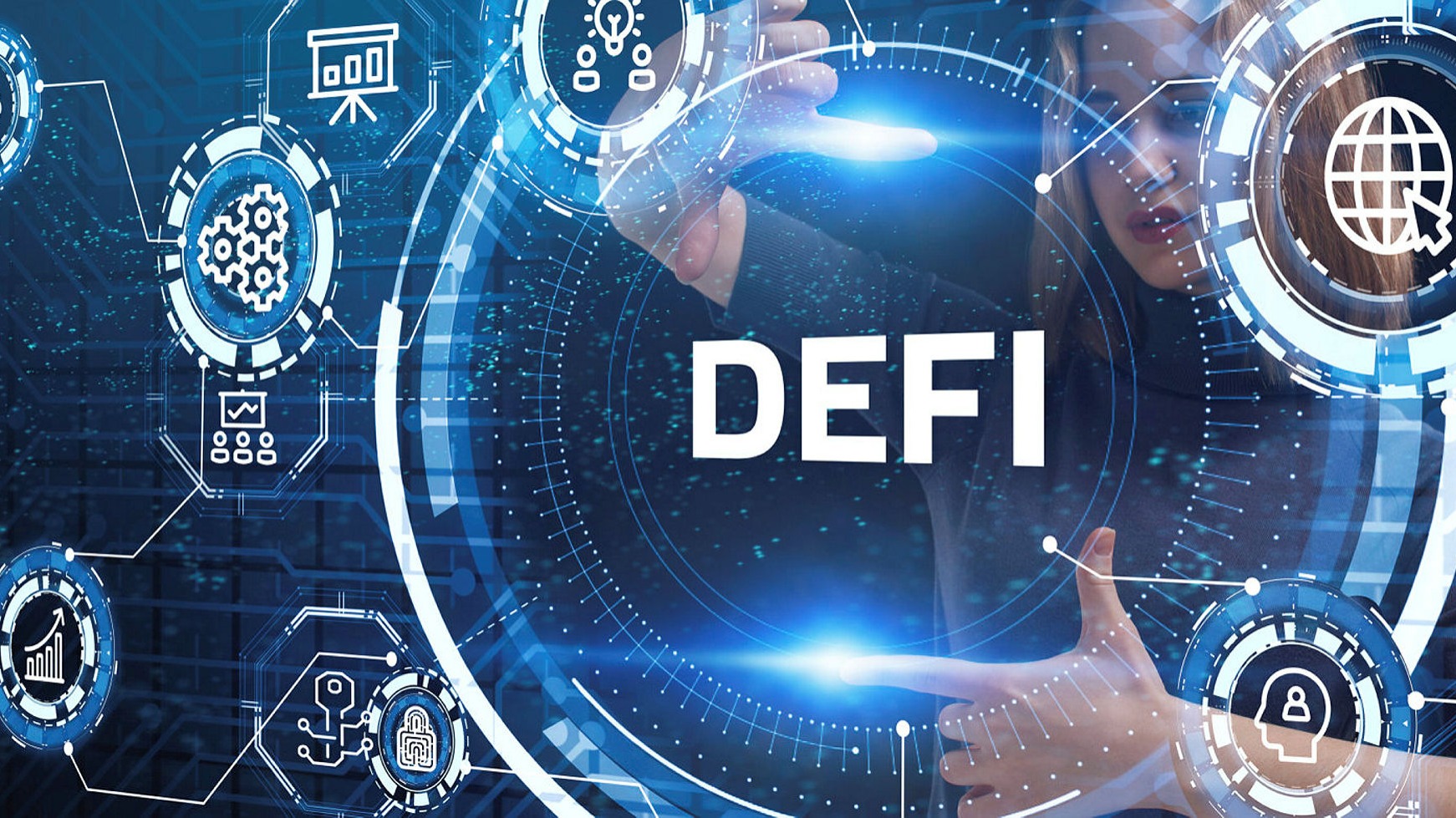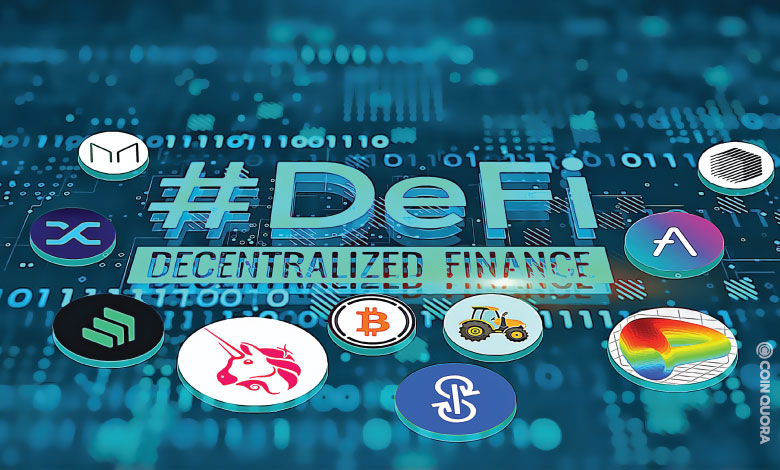Decentralized Finance (DeFi) Definition
May 09, 2022
What Is Decentralized Finance (DeFi)?
Decentralized finance (DeFi) is an emerging financial technology based on secure distributed ledgers similar to those used by cryptocurrencies. The system dismantles banks’ and institutions’ power over money, financial products, and services.
Some of the key attractions of DeFi for many consumers are:
-
- It eliminates the fees that banks and other financial companies charge for using their services.
- You hold your money in a secure digital wallet instead of keeping it in a bank.
- Anyone with an internet connection can use it without needing approval.
- You can transfer funds in seconds and minutes.

Understanding Decentralized Finance (DeFi)
To understand decentralized finance and how it works, you must understand how centralized finance differs from DeFi.
Centralized Finance
Your money is held by banks, corporations whose sole purpose is to make money. The financial system is full of third parties who facilitate money transfers between parties for a fee. Assume you buy a gallon of milk with your credit card. The charge goes to an acquiring bank, which then sends it to the credit card network.
The network cancels the charge and asks your bank to pay. Your bank approves the charge and sends it to the network via the acquiring bank. Because merchants must pay for your ability to use credit and debit cards, each link in the chain receives payment.
Other financial transactions are costly, and using a bank’s services while traveling may be impossible. DeFi aims to reduce transaction times and increase financial access.
Decentralized Finance
Decentralized finance eliminates intermediaries by allowing individuals, businesses, and merchants to transact using new technology. Peer-to-peer financial networks use security protocols, connectivity, software, and hardware advances to achieve this.
You can lend, trade, and borrow using software that records and verifies financial transactions in distributed financial databases. A distributed database collects and aggregates data from all users and uses consensus to verify it.
To eliminate centralized finance models, this technology allows anyone to use financial services anywhere, regardless of who or where they are. Personal wallets and trading services for individuals are provided by DeFi applications.
Decentralized finance removes third-party control but does not provide anonymity. Your transactions may not be traceable to you, but they are to those who have access. These entities may be governments, law enforcement, or other financial protection agencies.

How Does DeFi Work?
Decentralized finance uses the blockchain technology that cryptocurrencies use. A blockchain is a distributed and secured database or ledger. Applications called dApps are used to handle transactions and run the blockchain.3
In the blockchain, transactions are recorded in blocks and then verified by other users. If these verifiers agree on a transaction, the block is closed and encrypted; another block is created that has information about the previous block within it.
The blocks are “chained” together through the information in each proceeding block, giving it the name blockchain. Information in previous blocks cannot be changed without affecting the following blocks, so there is no way to alter a blockchain. This concept, along with other security protocols, provides the secure nature of a blockchain.
DeFi Financial Products
DeFi’s core premise is peer-to-peer financial transactions. In a P2P DeFi transaction, two parties agree to exchange cryptocurrency for goods or services.
Consider getting a loan in centralized finance. You’d need to apply at your bank or another lender. The lender would charge you interest and service fees if you were approved.
No interest or fees means no DeFi peer-to-peer lending. Because the lender can be anywhere in the world, you’ll have more options. Then an algorithm matches you with peers who meet your needs. Your next step is to accept a lender’s terms and get your loan.
The consensus mechanism verifies the transaction and you get your loan. You will then be billed at the agreed-upon intervals. When you pay via your dApp, the funds are transferred to the lender via the blockchain.
DeFi Currency
DeFi is designed to use cryptocurrency for transactions. The technology is still developing, so it is difficult to determine precisely how existing cryptocurrencies will be implemented, if at all. Much of the concept revolves around stablecoin, a cryptocurrency backed by an entity or pegged to fiat currency like the dollar.
The Future of DeFi
Decentralized finance is still in its infancy. For starters, it is unregulated, resulting in infrastructure failures, hacks, and scams. Today’s laws are based on the concept of distinct financial jurisdictions, each with its own set of rules. DeFi’s borderless transaction ability presents essential questions for this type of regulation. Who investigates a financial crime that crosses borders, protocols, and DeFi apps? Who would enforce the rules, and how?
The open and distributed nature of decentralized finance may cause issues for existing financial regulations. System stability, energy usage, carbon footprint, upgrades, maintenance, and hardware failures are other concerns.
Before the safe use of DeFi, many questions must be addressed. If DeFi succeeds, it’s likely that banks and corporations will find ways to get into the system, if not to control how you access your money, then to profit from it.

What Does Decentralized Finance Do?
The goal of DeFi is to get rid of the third parties that are involved in all financial transactions.
Is Bitcoin a Decentralized Finance?
Bitcoin is a cryptocurrency. DeFi is being designed to use cryptocurrency in its ecosystem, so Bitcoin isn’t DeFi as much as it is a part of it.
What Is Total Value Locked in DeFi?
Total value locked (TVL) is the sum of all staked, loaned, pooled, or other financial actions across DeFi. It can also be the sum of specific cryptocurrencies like ether or bitcoin.
Investing in cryptocurrencies and other ICOs is risky and speculative, and this article does not represent an investment recommendation by Investopedia or the author. Because every situation is different, you should always consult a professional before making any financial decisions. Investopedia makes no warranties or representations as to the accuracy or timeliness of the information.